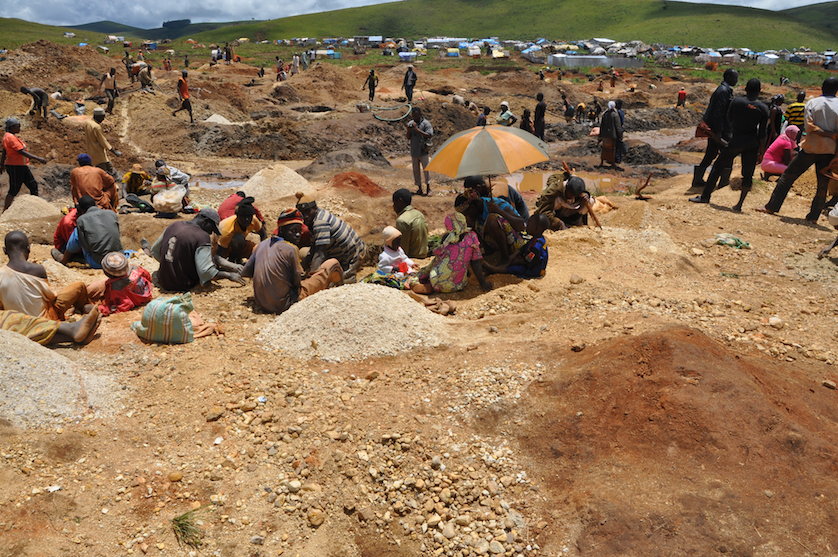
By Nnimmo Bassey
Workers labour to make a living. Sadly, for many the wages of work has been death. The occupational hazards that workers face is a challenge for those in the formal as well as in the informal sectors. Stringent regulatory and control measures as well as strong and united labour unions are needed to halt the menace.
We note that the health impacts of extractive activities swallow up lives beyond the mine pits as evidenced by the death of over 400 children from lead poisoning in Zamfara State, Nigeria.
The extractive sector is equally an arena of conflicts and has thrown up severe human rights abuses including displacement of communities, toxic work conditions, and the burying alive of artisanal miners in Ghana, Tanzania and other locations. It also includes outright shooting and killing of miners, as was the case in Marikana, South Africa.
In Namibia, miners digging up uranium ore for mining companies have ended up with lung cancers, leukemia, kidney diseases, and other ailments from the fine particles and radioactive gas inhaled during extraction of the ore.
Digging for uranium is almost akin to digging one’s grave. The level of care of the corporations can be gleaned from this comment by a Namibian miner, “Doctors were told not to inform us with our results or tell our illness. They only supply you with medications when you are totally finished up or about to die.”
Uranium and nuclear power plants are inseparable. Nigeria has found it difficult to run simple hydroelectric and thermal power plants. It would be suicidal to install nuclear power plants here. And to think of locating one in Akwa Ibom State is nothing but adding insult to injury in an already highly polluted Niger Delta. It will also be a time bomb set against the workers.
This intervention seeks to highlight the fact that workers and communities are at the frontlines of exposure to toxic chemicals that often result in fatalities.
Some of these impacts are subtle and do not immediately become manifest. Indeed, while communities may live on the rims or fence lines of extractive pits, workers are literally in the belly of the beasts. If the impacts on communities are so deadly, it is not difficult to agree that workers are often worse off.
Workers are part of communities and as we see especially with regard to artisanal mining, communities get co-opted as work teams by economic necessities or by the imposed daunting struggles for survival.
As the chisels, pickaxes and hammers hack away at rock faces to extract wealth and profit, the dusts clothe workers with toxins that leave them gasping for breath. Despite the health and safety measures announced by extractive sector corporations, workers sometimes are not aware of the dangers that their daily toil portend.
Sadly, however, some workers fully aware that they are making a dying, not a living, as they toil in dangerous activities continue in silence due to fear of job loses.
In a recent article, the ITUC general secretary declared poignantly – If You Expose Us, We’ll Expose You stressing that occupational cancer is not a mystery disease because there has been abundant evidence that workers are unreasonably exposed to danger while working with cancer-inducing chemicals.
Examples of such exposures include those suffered by workers dealing with asbestos and also those working in industries like the petrochemicals with high presence of benzene. According to the ITUC leader, “Wherever stricter controls are proposed, industry representatives or their hired guns appear, challenging the science and predicting an economic catastrophe.”
Extractive sector companies spend huge sums of money in efforts to block regulations seeking to curb the use of certain chemicals and to reduce the exposure of workers to harm. To do this they churn out tonnes of publications and glossy so-called sustainability reports while all the time promoting what has been described as paralysis by analysis.
Almost 1 million workers die every year from exposure to toxic chemicals – in the extractive sector and others. Up to 2.3 million persons get exposed to work-related diseases or accidents every year.
Permit me to remind us that the grave environmental and health impact caused by the oil and gas industry in Nigeria is an open sore that salt is being added to daily and cannot be allowed to continue to fester.
Routine gas flaring, rampant oil spills and reckless disposal of toxic wastes including drilling cuts and produced water, have health implications not just for our environment and community health but equally on oil and gas sector workers.
With life expectancy standing at just above 40 years in our oil field communities and at a paltry 54 years (some say 43 years) nationally, no one can claim to be exempt from the urgent need for actions to clean our air, land, water and workplaces.
The struggle to secure the health of workers, communities and our planet is an epic struggle against a ravenous system that feeds on profits and swims in the sweat and blood of workers.
The time has come for the dichotomy between workers and community to be eliminated. To change this system it is inescapable that all relevant forces – labour and all of us – must team up to confront reckless myopic consumption and a crass lack of concern about the future and the planet.
Let the conversations begin.










